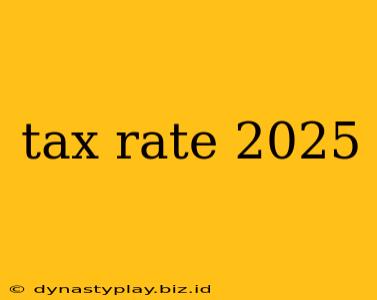The tax landscape is constantly shifting, and 2025 promises significant changes. Understanding these potential alterations is crucial for individuals and businesses alike to effectively plan their finances and minimize tax liabilities. While specifics are subject to legislative developments and may vary depending on your location and circumstances, we'll explore key areas likely to see adjustments in the 2025 tax rate.
Potential Changes in Federal Income Tax Rates for 2025
The 2017 Tax Cuts and Jobs Act included temporary provisions, many of which are set to expire at the end of 2025. This means a potential return to pre-2018 tax rates for many taxpayers. This could result in:
-
Higher individual income tax rates: Brackets could revert to levels seen before the 2017 tax cuts, leading to a substantial increase in tax liability for some. Carefully review the potential changes to your tax bracket to anticipate the impact on your personal finances.
-
Increased corporate tax rates: Similarly, the corporate tax rate might revert to a higher percentage, impacting businesses' profitability and investment strategies. Businesses should proactively analyze the potential implications and adapt their financial planning accordingly.
-
Changes to Standard Deduction and Exemptions: These deductions could also see adjustments, potentially affecting the overall tax burden for individuals. Stay informed about any modifications that could impact your eligibility and the amount you can deduct.
Understanding the Impact of Tax Rate Changes
The impending tax rate changes in 2025 necessitate a proactive approach to financial planning. Several strategies can help you navigate these potential adjustments:
-
Tax Loss Harvesting: Capital losses can offset capital gains, potentially reducing your overall tax liability. This is a strategy to consider before the year-end.
-
Tax-Advantaged Retirement Accounts: Maximize contributions to retirement accounts like 401(k)s and IRAs to reduce your taxable income.
State and Local Tax Implications (SALT)
Changes at the federal level can also influence state and local tax laws. Keep an eye out for updates from your state's tax authorities regarding potential adjustments to:
- State income tax rates: Some states may adjust their income tax rates in response to federal changes.
- Property taxes: Local property tax assessments and rates could also see revisions.
- Sales taxes: State sales tax rates may change independently of federal adjustments.
It is vital to consult your state's tax agency for the most current information on potential changes within your jurisdiction.
Preparing for 2025 Tax Rate Changes
Proactive planning is key. To mitigate potential tax increases in 2025, consider these actions:
-
Consult a tax professional: Seek advice from a qualified tax advisor or accountant to personalize your tax planning strategy based on your specific financial situation and potential implications of the upcoming tax rate changes. They can provide valuable insights and help you navigate the complexities of tax law.
-
Regularly review your financial situation: Monitor your income, expenses, and investments to anticipate the impact of any tax changes on your overall financial health.
-
Stay informed: Stay updated on any legislative developments and official announcements concerning tax rates and regulations by following reputable financial news sources and consulting with tax professionals.
Disclaimer: This article provides general information and should not be considered professional tax advice. Always consult a qualified tax advisor for personalized guidance. The information provided is based on current expectations and is subject to change based on legislative developments.
